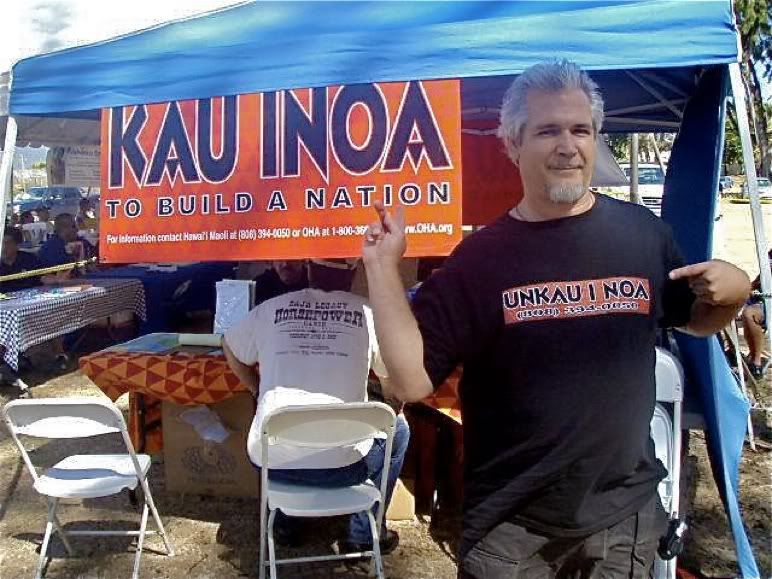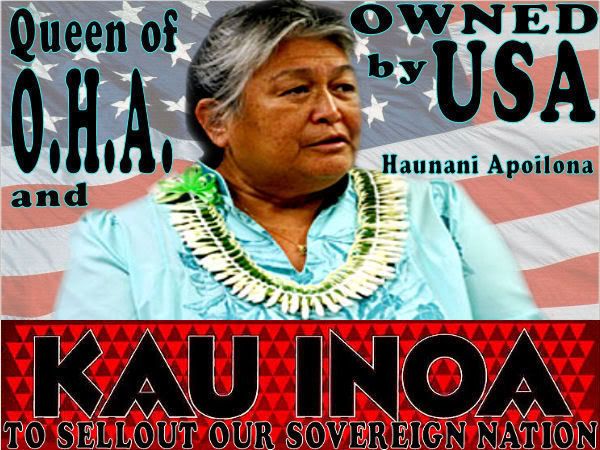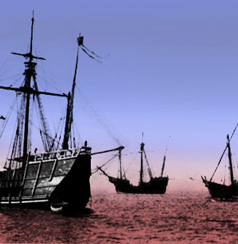 Click HERE For Details
Click HERE For Details
 Click HERE For Details
Click HERE For Details
 Click HERE For Details
Click HERE For Details
 UnKau Inoa Is Back!http://FreeHawaiiTV.com - Did You Sign OHA's Kau Inoa & Wish You Hadn't? UnKau Inoa's The Way To Remove Your Name So There's No More Shame. Watch & We'll Show You How To UnKau Now.Kau Inoa Exposedhttp://FreeHawaiiTV.com - Will Kau Inoa Be Used To Support The Akaka Bill? How Do They Get Signatures? Who Has Access To The Database? Here's The Answers. But Be Prepared - It Isn't Pretty.
UnKau Inoa Is Back!http://FreeHawaiiTV.com - Did You Sign OHA's Kau Inoa & Wish You Hadn't? UnKau Inoa's The Way To Remove Your Name So There's No More Shame. Watch & We'll Show You How To UnKau Now.Kau Inoa Exposedhttp://FreeHawaiiTV.com - Will Kau Inoa Be Used To Support The Akaka Bill? How Do They Get Signatures? Who Has Access To The Database? Here's The Answers. But Be Prepared - It Isn't Pretty.



 Hawaii court allows lawsuit over Kawaiahao Church gravesMediation urged in suit accusing church, state of violating burial lawsBy Gordon Y.K. Pang
Advertiser Staff WriterKawaiaha'o Church's plans for a new multipurpose building suffered a setback in state Circuit Court yesterday.Circuit Judge Karl Sakamoto denied motions by the church and the state seeking to dismiss a case that accuses the venerable church and state Department of Land and Natural Resources of fast-tracking the $17.5 million renovation project in violation of state burial laws.Often described as the "Westminster Abbey of the Pacific," Kawaiaha'o is one of the state's oldest and best-known churches. Many members of royalty are buried there, among them King William Charles Lunalilo.The project involves replacing the 69-year-old Likeke Hall, the church office building and an 18-stall parking lot with a two-story multipurpose building.Work began in January but was halted after burial remains were discovered.Campbell Estate heiress Abigail Kawananakoa, the niece of Queen Kapi'olani's great-grandniece, filed suit in July, claiming that the remains of her ancestors and others had been improperly disturbed and that the state allowed the church to bypass the scrutiny of the O'ahu Island Burial Council, as well as other regulations."My client wants (the church) to follow the procedures that are in place to protect not only her ancestors' graves, but to protect the public," said George Van Buren, Kawananakoa's attorney.Pointing out that dredging for the project already has resulted in the uncovering of 69 sets of human remains, Kawananakoa wants the church to gain approval from the O'ahu Island Burial Council, conduct an archaeological inventory survey and complete an environmental study before it proceeds.The cornerstone of the church's defense is that because the church maintains an active cemetery, it is outside the jurisdiction of the Public Trust Doctrine and therefore not subject to its more stringent regulations."Kawaiaha'o Church is a known, maintained and actively used cemetery that is not subject to the burial laws related to the prehistoric and historic burial sites," the church said in court documents, which also point out that remains were buried in the cemetery as recently as July.Sakamoto urged the two sides to seek mediation in the case, and attorneys for both sides said they are amenable to that.Van Buren said the judge "found that their reliance on an exception for actively maintained cemeteries was unavailing," striking a blow to the church's major argument.But Crystal Rose, an attorney for the church, said the only thing Sakamoto decided was to allow the case to proceed.While Sakamoto may have indicated that he now agrees with Kawananakoa's view that the church is not exempt from burial laws, "we welcome the opportunity to prove to the court that we are an actively maintained cemetery," Rose said.Deborah Ward, a DLNR spokeswoman, said the agency had not yet seen the decision and therefore could not comment.No trial date has been set.
Hawaii court allows lawsuit over Kawaiahao Church gravesMediation urged in suit accusing church, state of violating burial lawsBy Gordon Y.K. Pang
Advertiser Staff WriterKawaiaha'o Church's plans for a new multipurpose building suffered a setback in state Circuit Court yesterday.Circuit Judge Karl Sakamoto denied motions by the church and the state seeking to dismiss a case that accuses the venerable church and state Department of Land and Natural Resources of fast-tracking the $17.5 million renovation project in violation of state burial laws.Often described as the "Westminster Abbey of the Pacific," Kawaiaha'o is one of the state's oldest and best-known churches. Many members of royalty are buried there, among them King William Charles Lunalilo.The project involves replacing the 69-year-old Likeke Hall, the church office building and an 18-stall parking lot with a two-story multipurpose building.Work began in January but was halted after burial remains were discovered.Campbell Estate heiress Abigail Kawananakoa, the niece of Queen Kapi'olani's great-grandniece, filed suit in July, claiming that the remains of her ancestors and others had been improperly disturbed and that the state allowed the church to bypass the scrutiny of the O'ahu Island Burial Council, as well as other regulations."My client wants (the church) to follow the procedures that are in place to protect not only her ancestors' graves, but to protect the public," said George Van Buren, Kawananakoa's attorney.Pointing out that dredging for the project already has resulted in the uncovering of 69 sets of human remains, Kawananakoa wants the church to gain approval from the O'ahu Island Burial Council, conduct an archaeological inventory survey and complete an environmental study before it proceeds.The cornerstone of the church's defense is that because the church maintains an active cemetery, it is outside the jurisdiction of the Public Trust Doctrine and therefore not subject to its more stringent regulations."Kawaiaha'o Church is a known, maintained and actively used cemetery that is not subject to the burial laws related to the prehistoric and historic burial sites," the church said in court documents, which also point out that remains were buried in the cemetery as recently as July.Sakamoto urged the two sides to seek mediation in the case, and attorneys for both sides said they are amenable to that.Van Buren said the judge "found that their reliance on an exception for actively maintained cemeteries was unavailing," striking a blow to the church's major argument.But Crystal Rose, an attorney for the church, said the only thing Sakamoto decided was to allow the case to proceed.While Sakamoto may have indicated that he now agrees with Kawananakoa's view that the church is not exempt from burial laws, "we welcome the opportunity to prove to the court that we are an actively maintained cemetery," Rose said.Deborah Ward, a DLNR spokeswoman, said the agency had not yet seen the decision and therefore could not comment.No trial date has been set.
 Kauai agency to review permit process for home on burial groundsBy Michael Levine
The Garden IslandLIHUE — Almost two years after originally granting approval for Joseph Brescia to construct a controversial single-family home on burial grounds at Naue, the Kauai Planning Commission yesterday set a January hearing date to determine if terms of that permit have been followed.The approval was granted on the condition that Brescia "shall excavate the soil at the foundation locations and observe for any archaeological findings with a qualified archaeologist prior to actual construction of the proposed residence.""If any archaeological findings are discovered, the applicant shall cease construction immediately and contact the State Historic Preservation Division-DLNR and the County Planning Department to determine mitigative measures," the permit's Condition No. 5 states. "No building permit shall be issued until requirements of the State Historic Preservation Division and the Burial Council have been met."That condition was upheld last year when 5th Circuit Judge Kathleen Watanabe ruled that Brescia could continue with construction, provided that doing so caused no irreparable damage to the burials and did not prevent access to them.Watanabe also said the State Historic Preservation Division needed to go back to the start of its burial treatment plan process with the Kauai-Niihau Island Burial Council. The first time around, she said, SHPD did not properly follow the rules and laws pertaining to burials.In April 2008, the burial council said Brescia should preserve the burials in place and not move them. They have since been capped in concrete, much to the chagrin of the Native Hawaiian community and even some burial council members.To date, the burial council has not yet approved a burial treatment plan. It is scheduled to hold its first meeting in months next week, and it could discuss the 12th version of the plan. No agenda has yet been published.Watanabe's admonition to Brescia and the state could supply what attorneys refer to as the "law of the case," where a trial court's unappealed ruling stands as the law for a particular case unless different evidence is raised, a different view of the law is decided or the decision is clearly erroneous.In August, Native Hawaiian Legal Corporation Litigation Director Alan Murakami and attorney Camille Kalama filed, on behalf of self-described cultural practitioners Puanani Rogers and Jeffrey Chandler, a petition seeking a declaratory order announcing the commission's official position that Brescia's home is in non-compliance."There is good cause to modify the conditions of approval given the ongoing construction of a house on top of burial sites, the lack of an approved burial treatment plan, and the vote of the KNIBC to preserve the burial sites in place," the 12-page petition concludes.Despite objections from Walton Hong and Calvert Chipchase, two attorneys representing Brescia, that they had not been properly served documents and that the Planning Commission does not have the authority or jurisdiction to hear the case due to "procedural deficiencies," the commission set the contested case hearing for Jan. 12, 2010.Rogers said after the decision that she was "very relieved" because opponents of the construction have seemingly always lost in the past.The declaratory order could be issued pursuant to Chapter 10 of the commission's Rules of Practice and Procedure, but the petition also requests the revocation or modification of the approved permit, procedures that fall under Chapter 12 and were not discussed yesterday.Both the declaratory order and the potential revocation of the permit could prove to be too little, too late, at least for the Brescia property. Proponents and opponents of the development said yesterday that considerable construction has already occurred.Hong said he has not visited the property recently but it is his understanding that exterior walls are built, the roof is up, and many of the windows have been installed. He said the focus is currently on the interior walls.In July, Murakami said he expected construction to be finished before the end of 2009."The house is already complete, the burials are desecrated," Rogers said. However, she added that the case, no longer isolated, can set an important precedent because "the world is watching."Kalama said Monday that even if the house is allowed to stand, one of Native Hawaiian Legal Corporation's main goals is that the procedure of approving permits before the burial treatment plan is in place or cultural issues are addressed will not happen again."Even having a declaration from the county would prevent this from happening in the next round," Kalama said."The Planning Commission is under a magnifying glass," Rogers said. "We hope that they will do what is most fair to the iwi kupuna, to the kanaka maoli people and to our cultural rights and beliefs."
Kauai agency to review permit process for home on burial groundsBy Michael Levine
The Garden IslandLIHUE — Almost two years after originally granting approval for Joseph Brescia to construct a controversial single-family home on burial grounds at Naue, the Kauai Planning Commission yesterday set a January hearing date to determine if terms of that permit have been followed.The approval was granted on the condition that Brescia "shall excavate the soil at the foundation locations and observe for any archaeological findings with a qualified archaeologist prior to actual construction of the proposed residence.""If any archaeological findings are discovered, the applicant shall cease construction immediately and contact the State Historic Preservation Division-DLNR and the County Planning Department to determine mitigative measures," the permit's Condition No. 5 states. "No building permit shall be issued until requirements of the State Historic Preservation Division and the Burial Council have been met."That condition was upheld last year when 5th Circuit Judge Kathleen Watanabe ruled that Brescia could continue with construction, provided that doing so caused no irreparable damage to the burials and did not prevent access to them.Watanabe also said the State Historic Preservation Division needed to go back to the start of its burial treatment plan process with the Kauai-Niihau Island Burial Council. The first time around, she said, SHPD did not properly follow the rules and laws pertaining to burials.In April 2008, the burial council said Brescia should preserve the burials in place and not move them. They have since been capped in concrete, much to the chagrin of the Native Hawaiian community and even some burial council members.To date, the burial council has not yet approved a burial treatment plan. It is scheduled to hold its first meeting in months next week, and it could discuss the 12th version of the plan. No agenda has yet been published.Watanabe's admonition to Brescia and the state could supply what attorneys refer to as the "law of the case," where a trial court's unappealed ruling stands as the law for a particular case unless different evidence is raised, a different view of the law is decided or the decision is clearly erroneous.In August, Native Hawaiian Legal Corporation Litigation Director Alan Murakami and attorney Camille Kalama filed, on behalf of self-described cultural practitioners Puanani Rogers and Jeffrey Chandler, a petition seeking a declaratory order announcing the commission's official position that Brescia's home is in non-compliance."There is good cause to modify the conditions of approval given the ongoing construction of a house on top of burial sites, the lack of an approved burial treatment plan, and the vote of the KNIBC to preserve the burial sites in place," the 12-page petition concludes.Despite objections from Walton Hong and Calvert Chipchase, two attorneys representing Brescia, that they had not been properly served documents and that the Planning Commission does not have the authority or jurisdiction to hear the case due to "procedural deficiencies," the commission set the contested case hearing for Jan. 12, 2010.Rogers said after the decision that she was "very relieved" because opponents of the construction have seemingly always lost in the past.The declaratory order could be issued pursuant to Chapter 10 of the commission's Rules of Practice and Procedure, but the petition also requests the revocation or modification of the approved permit, procedures that fall under Chapter 12 and were not discussed yesterday.Both the declaratory order and the potential revocation of the permit could prove to be too little, too late, at least for the Brescia property. Proponents and opponents of the development said yesterday that considerable construction has already occurred.Hong said he has not visited the property recently but it is his understanding that exterior walls are built, the roof is up, and many of the windows have been installed. He said the focus is currently on the interior walls.In July, Murakami said he expected construction to be finished before the end of 2009."The house is already complete, the burials are desecrated," Rogers said. However, she added that the case, no longer isolated, can set an important precedent because "the world is watching."Kalama said Monday that even if the house is allowed to stand, one of Native Hawaiian Legal Corporation's main goals is that the procedure of approving permits before the burial treatment plan is in place or cultural issues are addressed will not happen again."Even having a declaration from the county would prevent this from happening in the next round," Kalama said."The Planning Commission is under a magnifying glass," Rogers said. "We hope that they will do what is most fair to the iwi kupuna, to the kanaka maoli people and to our cultural rights and beliefs."
 THE RETURN OF ???FIND OUT HERE TOMORROW!
THE RETURN OF ???FIND OUT HERE TOMORROW!
Monday 12 October 2009
by: Dahr Jamail and Jason Coppola, t r u t h o u t | Feature
The Nina, the Pinta and the Santa Maria lying in the North River, New York, in 1912. (Photo Illustration: Jared Rodriguez / t r u t h o u t)
»
 Find Out Here - HawaiiFakeState.com
Find Out Here - HawaiiFakeState.com